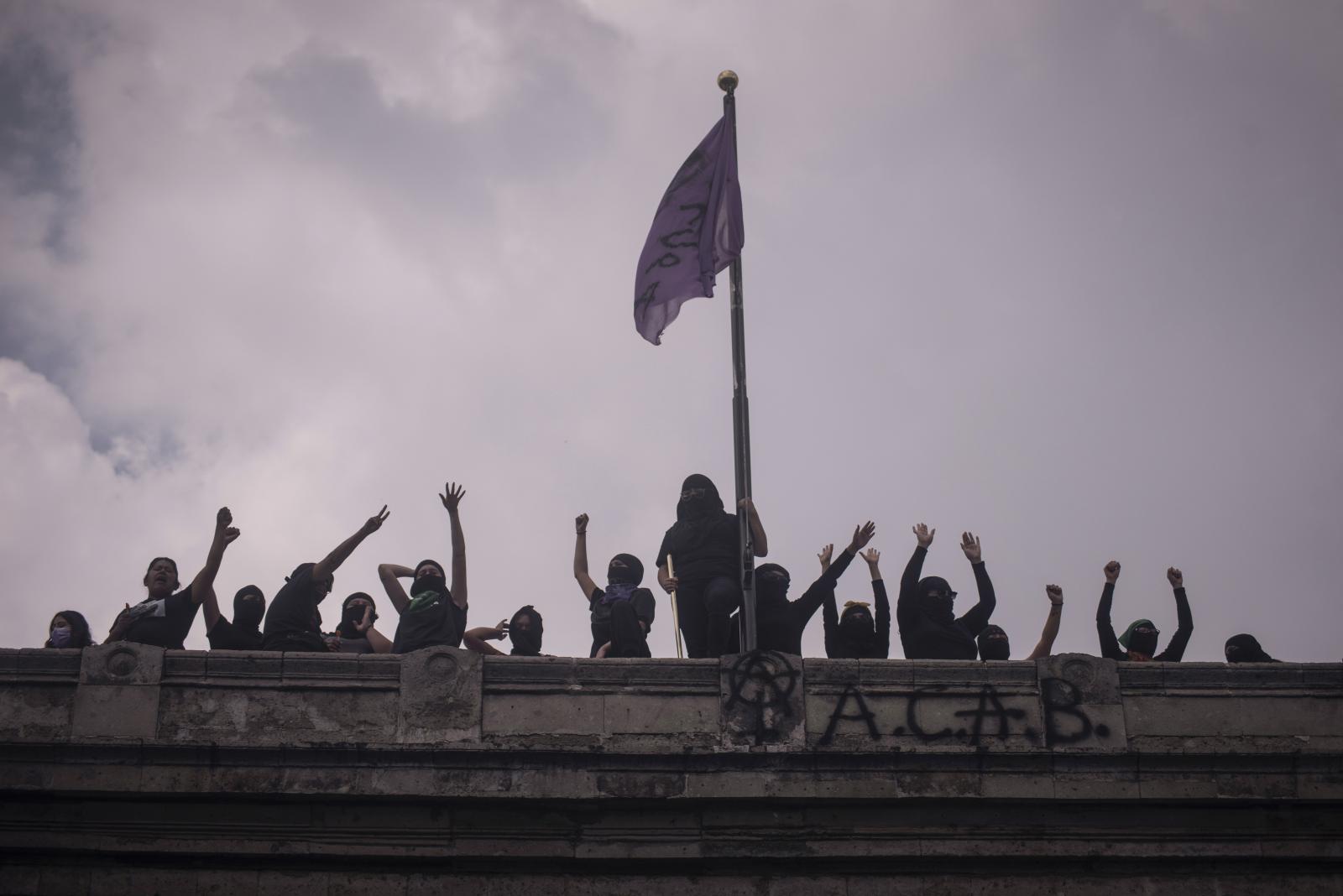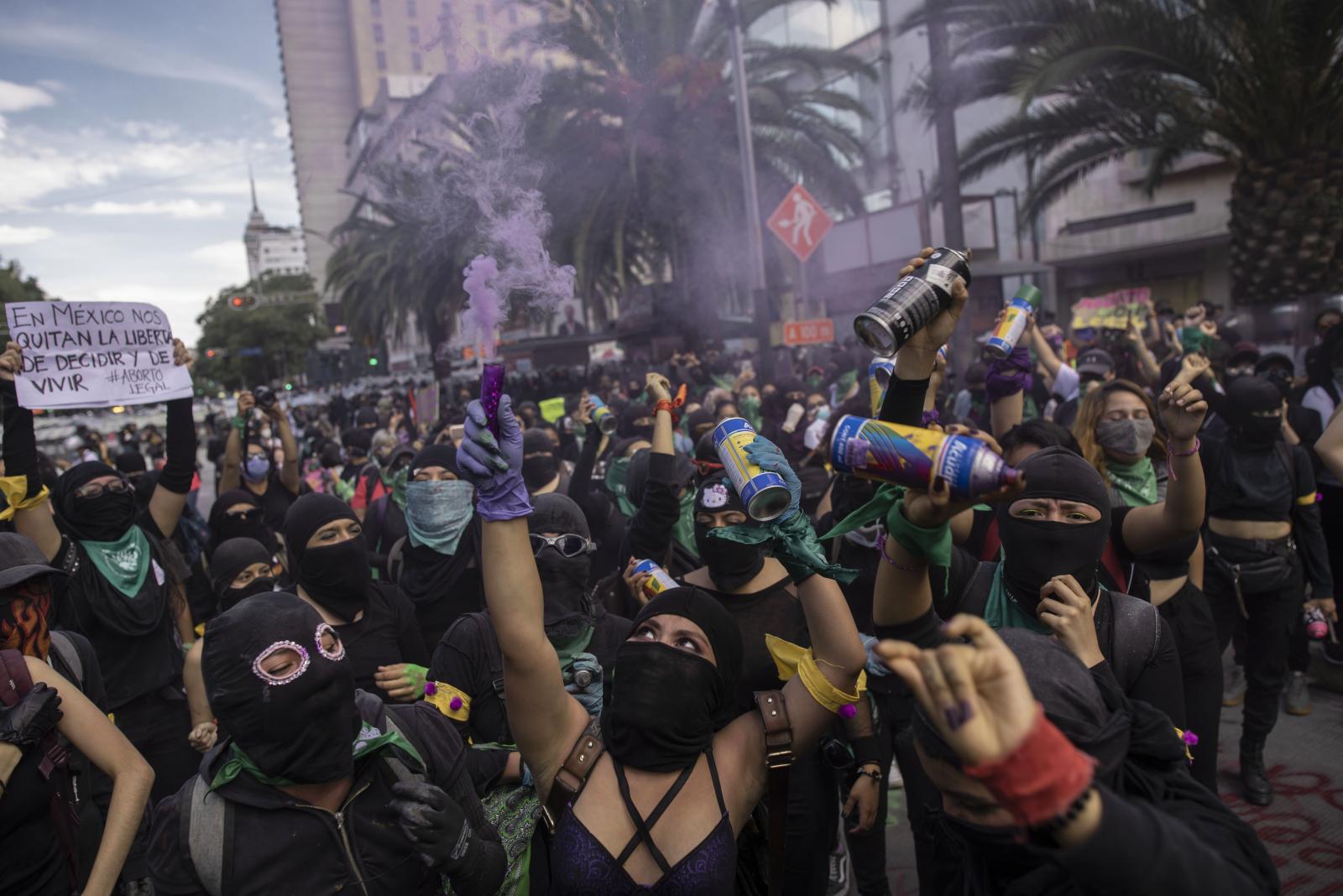Public Project
We are not hysterical, we are historical
Feminist groups organized and called for a national strike as a form of protest for the government's indifference to femicides, invited women from society to take to the streets on March 8 and later to stop activities on March 9 at all levels: work, school and home. This form of protest once again demonstrated the urgency to address violence and seek the creation of policies that support the right of women to have guaranteed security. 11 days later the quarantine began due to the arrival of the Covid-19 pandemic. Due to this, a large percentage of women had to face domestic violence, thus causing an increase in femicides due to confinement with their aggressors.
In September 2020, the head of the National Human Rights Commission, Rosario Piedra, received in her office a group of relatives of victims, murdered, disappeared and violated women. Among them was Marcela Alemán, mother of a girl who was sexually assaulted in 2017 by teachers at her school; She, along with other women, took over the CNDH facilities, thus forming the Okupa "Ni Unas Menos." A refuge for violated women in need of a safe space, made up of young members of the feminist black bloc and mothers of victims.
This event marked a before and after in the history of the fourth wave of the feminist movement in Mexico. Inspiring the new generations to go out and fight for their safety and not to remain silent in the face of violations of their rights, thus causing the arrival of demonstrations on distinctive dates such as September 28, the day that women come out to demand the guarantee of an abortion safe, legal and free. These demonstrations have sparked violent clashes against police officers, as well as on November 25, the International Day for the Elimination of Violence against Women and Girls.
The women of the feminist black bloc cover their faces with black hoods to protect their identity due to the anarchist acts that characterize them, they have become a powerful symbol of the Mexican feminist movement, fighting through direct action techniques such as throwing Molotov bombs, confronting to police officers and spray-paint messages of nonconformity against the system that governs us.
La Organización de las Naciones Unidas (UN), a través de la oficina del alto comisionado de Derechos Humanos, afirmó que en México son asesinadas 10.5 mujeres al día, cifra registrada por el Observatorio Nacional Ciudadano del Feminicidio (ONCF), convirtiendo al Estado de México y a Veracruz en los lugares más peligrosos para las mexicanas.
Grupos feministas se organizaron y convocaron a realizar un paro nacional como forma de protesta por la indiferencia del gobierno ante los feminicidios, invitaron a mujeres de la sociedad a tomar las calles el 8 y posteriormente a parar actividades el 9 de Marzo en todos los niveles: el trabajo, la escuela y el hogar. Esta forma de protesta evidenció una vez más la urgencia por atender las violencia y buscar la creación de políticas que respalden el derecho de las mujeres a tener seguridad garantizada. 11 días después comenzó la cuarentena debido a la llegada de la pandemia por Covid-19. Debido a esto, un gran porcentaje de mujeres se tuvieron que enfrentar a la violencia intrafamiliar, provocando así el incremento de feminicidios por el encierro con sus agresores.
En Septiembre del 2020, la titular de la Comisión Nacional de Derechos Humanos, Rosario Piedra, recibió en su oficina a un grupo de familiares de víctimas, mujeres asesinadas, desaparecidas y violentadas. Entre ellas iba Marcela Alemán, madre de una niña agredida sexualmente en el año 2017, por maestras de su colegio; Ella junto a otras mujeres, tomaron las instalaciones de la CNDH, formando así, la Okupa “Ni Unas Menos.” Un refugio para mujeres violentadas y necesitadas de un espacio seguro, conformado por jóvenes miembros del bloque negro feminista y madres de víctimas.
Este suceso marcó un antes y un después en la historia de la cuarta ola del movimiento feminista en México; inspirando a las nuevas generaciones a salir a luchar por su seguridad y a no guardar silencio ante las violaciones de sus derechos, provocando así la llegada de manifestaciones en fechas distintivas como el 28 de Septiembre, día que las mujeres salen a exigir la garantía de un aborto seguro, legal y gratuito. Dichas manifestaciones han provocado enfrentamientos violentos contra policías, al igual que el 25 de Noviembre, Día Internacional de la eliminación de la violencia contra las mujeres y niñas.
Las mujeres del bloque negro feminista cubren su rostro con capuchas negras para cuidar su identidad debido a los actos anarquistas que las caracteriza, se han convertido en un poderoso símbolo del movimiento feminista mexicano, luchando través de técnicas de acción directa como lanzar bombas Molotov, enfrentarse a policias y pintar con aerosol mensajes de inconformidad contra el sistema que nos gobierna.
Grupos feministas se organizaron y convocaron a realizar un paro nacional como forma de protesta por la indiferencia del gobierno ante los feminicidios, invitaron a mujeres de la sociedad a tomar las calles el 8 y posteriormente a parar actividades el 9 de Marzo en todos los niveles: el trabajo, la escuela y el hogar. Esta forma de protesta evidenció una vez más la urgencia por atender las violencia y buscar la creación de políticas que respalden el derecho de las mujeres a tener seguridad garantizada. 11 días después comenzó la cuarentena debido a la llegada de la pandemia por Covid-19. Debido a esto, un gran porcentaje de mujeres se tuvieron que enfrentar a la violencia intrafamiliar, provocando así el incremento de feminicidios por el encierro con sus agresores.
En Septiembre del 2020, la titular de la Comisión Nacional de Derechos Humanos, Rosario Piedra, recibió en su oficina a un grupo de familiares de víctimas, mujeres asesinadas, desaparecidas y violentadas. Entre ellas iba Marcela Alemán, madre de una niña agredida sexualmente en el año 2017, por maestras de su colegio; Ella junto a otras mujeres, tomaron las instalaciones de la CNDH, formando así, la Okupa “Ni Unas Menos.” Un refugio para mujeres violentadas y necesitadas de un espacio seguro, conformado por jóvenes miembros del bloque negro feminista y madres de víctimas.
Este suceso marcó un antes y un después en la historia de la cuarta ola del movimiento feminista en México; inspirando a las nuevas generaciones a salir a luchar por su seguridad y a no guardar silencio ante las violaciones de sus derechos, provocando así la llegada de manifestaciones en fechas distintivas como el 28 de Septiembre, día que las mujeres salen a exigir la garantía de un aborto seguro, legal y gratuito. Dichas manifestaciones han provocado enfrentamientos violentos contra policías, al igual que el 25 de Noviembre, Día Internacional de la eliminación de la violencia contra las mujeres y niñas.
Las mujeres del bloque negro feminista cubren su rostro con capuchas negras para cuidar su identidad debido a los actos anarquistas que las caracteriza, se han convertido en un poderoso símbolo del movimiento feminista mexicano, luchando través de técnicas de acción directa como lanzar bombas Molotov, enfrentarse a policias y pintar con aerosol mensajes de inconformidad contra el sistema que nos gobierna.
5,705


















